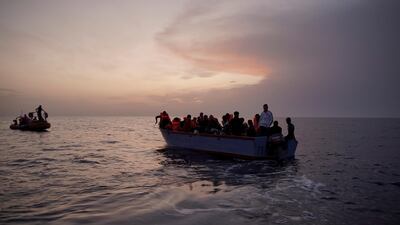The UN refugee agency says Libya’s coast guard has rescued about 70 Europe-bound migrants after days in distress on the Mediterranean Sea.
Once they were brought ashore, the migrants fled, with no attempt made to stop them, a navy official told Reuters.
The migrants were originally aboard a boat which capsized Saturday off Libya, UNHCR and the country’s coast guard said.
Coast guard spokesman Ayoub Gassim said the shipwreck took place off the western city of Misrata, 187 kilometers east of the capital, Tripoli.
None of the migrants drowned or were hurt in the incident, though two were in a poor condition after four days at sea without food and water and they received medical treatment, said an official, who spoke on condition of anonymity.
"After the illegal migrants were brought back to the shore at around 9.30 am they fled," the official said.
The incident took place in the town of Al-Khums, some 120 kilometres east of Tripoli.
The navy official, speaking in Al-Khums, said there were no orders to use force to intercept the migrants, and officials did not try to move them to detention centres run by the UN-recognised Government of National Accord.
A coastguard spokesman in Tripoli, Ayoub Qassem, confirmed the rescue operation but said the migrants had been released after failed attempts to move them to a detention centre.
Another boat carrying 56 others is in danger, an independent support group said.
Alarm Phone said it received a call from migrants on the boat, who left Libya’s shores days ago, saying that “they are desperately calling for help and are afraid to die.”
“They are still in distress at sea with no rescue in sight. They have now been at sea for over 60 hours,” the group said.
Libya became a major crossing point for migrants to Europe after the overthrow and death of longtime dictator Muammar Qaddafi in 2011, when the North African nation was thrown into chaos, armed militias proliferated and central authority collapsed.
In recent years, the European Union has partnered with the coast guard and other Libyan forces to try to stop the dangerous sea crossings.
Rights groups say those efforts have left migrants at the mercy of armed groups or confined in squalid detention centres that lack adequate food and water.
At least 6,000 migrants from Eritrea, Ethiopia, Somalia, Sudan and other nations are locked in dozens of detention facilities in Libya.
There are limited supplies for the migrants, who often end up there after arduous journeys at the mercy of abusive traffickers who hold them for ransom from their families.

